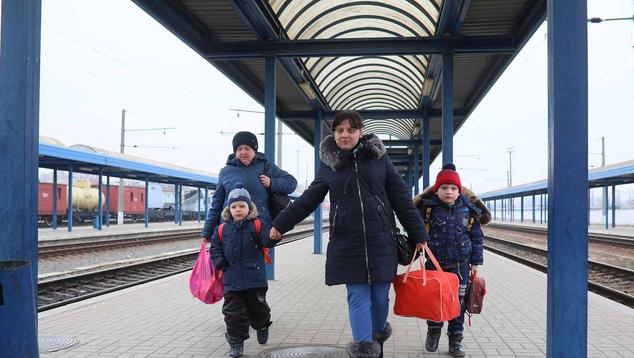Story Highlights
- Majorities in Moldova, Romania say migrants living in their country is a “good thing”
- In Hungary, attitudes improved most dramatically
WASHINGTON, D.C. -- In the wake of Russia’s invasion of Ukraine a year ago and the refugee crisis that it triggered, attitudes toward migrants brightened among many of Ukraine’s neighbors that absorbed people fleeing the conflict.
In four out of the five countries to Ukraine’s west -- including Hungary, Poland, Romania and Slovakia -- the percentage of people who consider migrants living in their country as a “good thing” improved to some degree last year compared with attitudes in 2019. In the fifth country -- Moldova -- views of migrants remained steady between 2019 and 2022, but more Moldovans saw migrants as a good thing than they did in 2016.
These results, which come from the 2022 Gallup World Poll, are particularly striking given that these nations have consistently ranked among the least accepting in the world for migrants. This was especially true in 2016, amid the European migration crisis that saw millions of people leave conflict-ridden places such as Syria, Iraq and Afghanistan for safer locales in Europe.
Few residents in the five countries along Ukraine’s western border -- or virtually anywhere else in Eastern Europe -- wanted to open their doors to this vulnerable population. That same year, few people in these countries described migrants living in their country as a good thing, including 30% of Moldovans, 28% of Poles, 20% of Romanians, 9% of Hungarians and 8% of Slovakians. Hungary and Slovakia each placed in the bottom 10 of Gallup’s Migrant Acceptance Index for 2016.
In contrast with the situation in 2016, Ukrainian refugees who have poured into these countries over the past year have generally been welcomed, at least from a policy point of view (though some of these countries have recently passed legislation tightening the level of support Ukrainian refugees receive).
Poland has accepted more than 1 million Ukrainian refugees, according to the United Nations -- more than any other country. Meanwhile, Romania, Slovakia and Moldova have all accepted over 100,000 Ukrainian refugees since the crisis began, an amount that exceeds most other countries.
This apparent tension between these nations’ public stance toward Ukrainian refugees and their historic antipathy for migrants could threaten, as Gallup wrote one year ago, to “test the hospitality to migrants in countries where this is already in somewhat short supply.” While public opinion could yet turn against the displaced Ukrainians living in these places, there is no sign in the data that attitudes are receding to previous levels.
- In Romania, for example, 55% of people described migrants living in their country as a good thing in 2022, a 16-percentage-point increase since 2019. While attitudes about migrants have been improving in Romania since 2016, this latest reading is the first time that a majority of Romanians have thought favorably of migrants living in their country.
- In Hungary, the percentage of people who said migrants living in their country was a good thing improved the most dramatically, rising to 43% in 2022 from an anemic 8% in 2019. It’s important to note that Gallup interviewed by telephone in 2022 in Hungary, while interviewing in 2016 and 2019 was conducted in person.
- Slightly more people in Poland thought migrants living in their country was a good thing in 2022 compared with 2019, with this figure rising to 48% from 42%. More generally, Polish attitudes toward migrants have been growing more positive since 2016, and this trend continued in 2022, albeit in modest fashion.
- Slovakia and Moldova are somewhat exceptions to the general trend, though in different ways. Attitudes toward migrants in Slovakia did become slightly more positive in 2022, rising to 25% from 18% in 2019, though this remains far from the predominant viewpoint in this country. Nearly twice as many Slovakians instead saw migrants living in their country as a “bad thing” (44%), though this is down slightly from the 50% who said so in 2019.
- In Moldova, by contrast, the 54% who said migrants living in their country was a good thing is statistically indistinguishable from the 50% who said so in 2019 -- they nonetheless remained net positive. Like Poles, Moldovans’ opinions of migrants have been rising since 2016.
Bottom Line
When Russia decided to wage war against Ukraine one year ago, Gallup’s trend on migrant acceptance in countries neighboring the conflict suggested that the refugee situation emanating from the war in Ukraine might test the hospitality of its five western neighbors, especially in light of these countries’ history of opposition to migrants. However, the most recent data suggest some of this opposition could be softening.
To stay up to date with the latest Gallup News insights and updates, follow us on Twitter.
For complete methodology and specific survey dates, please review Gallup's Country Data Set details.
Learn more about how the Gallup World Poll works.




